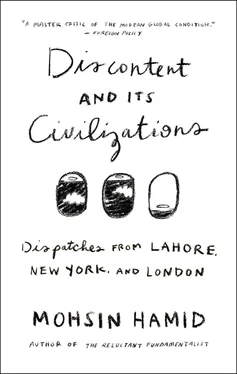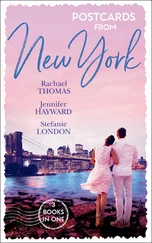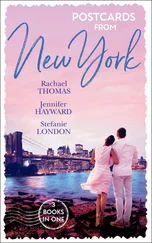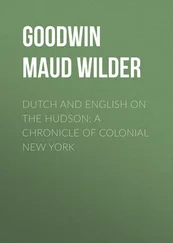(2007)
I TEND TO REREAD small books. This wasn’t always the case — when I was younger I reread long volumes, too. I spent many a summer making my way, again and again, through Tolkien’s capacious fantasies and Frank Herbert’s sprawling sci-fi. But in the two decades that I have been writing novels myself I have reread infrequently, and what I have reread has mostly been short. Tabucchi’s Pereira Declares tugs me back now, and Murakami’s Sputnik Sweetheart . Perhaps it is because I find the slender literary long form innately interesting. Perhaps it is because novels are like affairs, and small novels — with fewer pages of plot to them — are affairs with less history, affairs that involved just a few glances across a dinner table or a single ride together, unspeaking, on a train, and therefore affairs still electric with potential, still heart-quickening, even after the passage of all these years.
(2012)
Get Fit with Haruki Murakami
WHEN I MOVED back to Lahore a few years ago, I left my writer friends behind. I had cousins in Lahore, a couple dozen of them, and tight childhood buddies, and aunts and uncles and nephews and nieces. But no writers I was really close to, not at first. No one I could meet for a drink to talk shop. For that, I still needed to visit my former hometowns of New York and London, which didn’t happen more than a couple of times a year.
I was happy to be away from the noise of publishing: the book launches, the award ceremonies, the cycle of who got reviewed how this week. But I missed the camaraderie. Novel writing is solitary work. In Lahore it became a solitary profession, too.
So I started reading novelists to hang out with them. Not their novels, which of course I’d always read, but their memoirs, their essays on their writing, their interviews. I dug out old classics like A Moveable Feast . I asked my neighborhood bookshop to order up Márquez on Márquez, Calvino on Calvino, the multiple volumes of the Paris Review Interviews. Ah, the Paris Review Interviews: orgiastic to a writer who’s been on his own awhile, let me tell you.
It was in volume 4 that I came across one with Haruki Murakami, a writer I’d long admired. And halfway into that interview, I found this quote, which I wound up rereading so often that I copied it out and taped it to my printer: “Writing a long novel is like survival training. Physical strength is as necessary as artistic sensitivity.”
I liked this. Not that I thought it was true. But I liked it. Yes, Tolstoy did his share of war fighting, and Hemingway was a tough guy. But I’m not sure Nabokov could bench his weight. And I had the sense Virginia Woolf couldn’t, either (although her biographical details were sketchy in my mind; maybe Bloomsbury was the Octagon of its era).
Nonetheless, like much else that comes from Murakami, that quote only seems easily dismissed while managing somehow to stick with you. There’s a fine line between “you’ve got to be kidding” and genius, and Murakami walks it all the time. Or runs it, as it turns out. Because I next bought his memoir-cum-musings-on-writing, What I Talk About When I Talk About Running , and learned the man runs like a fiend. He runs miles a day, every day. And then sometimes he swims. He’s done ultra-marathons, triathlons. He doesn’t just talk the talk. He splashes-runs-pedals the hell out of the walk.
Now, at the time I encountered the Murakami quote, I was stuck. My third novel was going nowhere. Maybe it was being a new father. Maybe it was the spate of terrorist bombings hitting Lahore. Maybe it was the heat — and the cold, because although Lahore is mostly warm, the short winters can get pretty cold and natural gas shortages plus poor insulation mean you’re cold indoors, constantly. But probably it was none of those things. My first two novels took seven years each, and I throw out draft after draft. Being stuck comes as naturally to me as running comes to Murakami.
I needed to get unstuck. And, nearing the age of forty, I’d already used up many of the usual tricks writers before me had employed to shake things up when they were in a rut: travel chemically, break your heart, change continents, get married, have a child, quit your job, etc. I was desperate. So I started to walk. Every morning. First thing, as soon as I got up, which as a dad now meant six or seven a.m. I walked for half an hour. Then I walked for an hour. Then I walked for ninety minutes. My wife was amused. Good-bye Hamid, hello Hamster — that sort of thing.
(As an aside, a cousin of mine in Karachi, an anti-intellectual, hard-partying, gun-carrying, off-for-the-weekend-in-his-jeep-hunting kind of guy, took up reading around this time. His wife would wake to find him with the night-light on, engrossed in a novel. “It’s weird,” she told him, “but I like it.” She called it his midlife crisis.)
Murakami’s quote is about writing long novels. I write short novels. So it made sense that while he has to run to get fit enough to do what he has to do, I could manage with just walking. And, the significant speed difference notwithstanding, a daily five-mile walk turned out to be exactly what I needed. My head cleared. My energy soared. My neck pains diminished. Sometimes I texted myself ideas, sentences, entire paragraphs as I walked. Other times I just floated along, arms at my sides, stewing and filtering and looking.
Walking unlocked me. It’s like LSD. Or a library. It does things to you. I finished my novel in only two more years (for a total of six), walking every day. And I don’t plan on stopping. If the choice is between extended periods of abject writing failure and prescription orthotics, I know which side my man Murakami and I are on.
I’m now gearing up to launch into novel four. Murakami’s quote is still taped to my printer. It’s been joined by a cluster of others: senior writers I haven’t met, helping out a frequently struggling younger colleague in Lahore.
They collectively surround, I’ve just noticed, an old piece of paper. It’s a to-do list I’ve been ignoring, and should really take care of.
(2013)
Enduring Love of the Second Person
I THINK I’VE ALWAYS been drawn to the second person. When I was growing up and playing with my friends, the usual way we interacted with imaginary worlds was as characters: a bench was “your” boat, leaves on a lawn were the fins of sharks out to get “you.” Make-believe storytelling, which is to say fiction, wasn’t exclusively about being an observer — not for me, at least. There was this other strand as well, of being a participant.
Just before my family moved back to Pakistan, I encountered Dungeons & Dragons as a nine-year-old in California. That fantasy game was spellbinding for me. To understand the rules, you had to read books. But then you were free to create. It was collective imagining with a shared narrative. The Dungeon Master — a figure somewhere between an author and a referee — set in motion a tale that players spun together. It was as a DM, I’m pretty sure, that my proto-novelistic skills were first honed.
Of course, I read a lot, too. There seemed to be a constant stream of asides directly addressing the reader in children’s books, a sort of conspiratorial “you” that cropped up again and again. Then there were those hybrids of role-playing game and children’s book: game books like the Choose Your Own Adventure series, which briefly, in that time before computers were readily available, occupied a full shelf of my neighborhood bookshop in Lahore.
Slowly, from comic books and sci-fi and sword and sorcery, my reading interests stretched out in my late teens to encompass Hemingway and Tolstoy and Márquez. When I moved back to America for college and signed up for a creative writing class, I had no idea I wanted to be a writer. When the semester ended, I didn’t want to be anything else.
Читать дальше












